- with readers working within the Basic Industries industries
- within Real Estate and Construction and Law Practice Management topic(s)
Key Takeaways:
- With the return of 100% bonus depreciation, CFOs can now offset capital investments faster and improve post-tax ROI.
- Trade volatility demands flexible supply chain planning and cost-sharing tactics to protect margins.
- Tax teams play a growing role in strategy — early integration helps manage risk and unlock value.
As the U.S. tax landscape continues to evolve, manufacturing and distribution companies are facing financial pressures from both legislative changes and an unpredictable global trade environment. Recent developments including the One Big Beautiful Bill Act (OBBBA)— are reshaping the financial calculus for capital investment, supply chain management, and tax planning.
Your finance team isn't alone in tackling these shifts — tax departments are now playing a more visible role in strategic conversations across the business. As a CFO, your ability to integrate this perspective into decision-making could become a key driver of performance and resilience.
Top Concerns: Customs, Tariffs, and Policy Instability
According to the 2025 BDO Tax Strategist Survey, 40% of manufacturing leaders cited customs and trade rules as their top challenge this year. Tariff fluctuations are putting pressure on margins and prompting operational pivots — from pricing strategy to supplier choice.
To stay agile, CFOs are bringing tax and trade professionals into strategic discussions earlier to model scenarios, inform capital decisions, and assess risk in real-time. In fact, 60% of manufacturers now say their tax functions are directly involved in supply chain planning.
Key Provisions in the OBBBA Impacting Finance Strategy
The OBBBA introduces several changes that affect your capital strategy, tax liability, and ability to reinvest:
- 100% bonus depreciation returns: Eligible capital purchases, including machinery and production-related property, can once again be fully expensed in the year they're placed in service (post-January 19, 2025). For CFOs considering upgrades or expansion, taking advantage of bonus depreciation offers an opportunity to reduce after-tax investment costs.
- Research expensing restored: Domestic R&D costs can again be fully deducted, rather than amortized. If your company is investing in process improvement or product innovation, this change may boost ROI.
- More favorable interest deduction: Manufacturers often use debt to fuel growth. Under the new rules, depreciation and amortization are removed from the adjusted taxable income (ATI) calculation, meaning you can deduct more interest — lowering taxable income and improving cash flow.
- Clean energy credits scaled back: Some clean energy incentives are being phased out or restricted. If your business has been exploring solar, wind, or battery storage, there are new deadlines to qualify as well as sourcing requirements to meet. These changes may require you to reevaluate the business case for certain projects.
- Bigger tax credit for chip manufacturers: If your business is in the semiconductor supply chain or chip production, the investment credit has increased from 25% to 35%, a potential catalyst for accelerating build-out plans.
What To Do With the Tax Savings?
Not every company will apply savings the same way. Some may use it to fund automation or technology upgrades. Others may hold cash to preserve margins as tariffs continue to fluctuate. Depending on your risk posture and capital plan, this is an opportunity to redirect dollars toward what matters most — whether that's resilience, innovation, or reinvestment.
Addressing Trade Disruption: What CFOs Are Prioritizing
Shifting global alliances and tariff schedules have triggered more than headline risks. They're impacting pricing, profitability, and supply chain resilience. Here's how manufacturers are responding:
- Transfer pricing reviews: Many CFOs are reassessing internal pricing models to align with recent cost structures and avoid compliance risks.
- Sourcing strategy tweaks: Rather than making dramatic overhauls, most are taking incremental steps — like adjusting supplier terms or diversifying sourcing geographies.
- Cost sharing along the chain: To manage tariff cost increases, manufacturers are negotiating with suppliers and customers to share the financial burden via rebates or surcharges.
- Onshoring slowdown: While some had relocated operations back to the U.S., ongoing tariff unpredictability has made more agile logistics and routing the preferred focus.
Tariff compliance is also drawing increased scrutiny from the Department of Justice (DOJ), making it vital to have strong documentation and controls in place.

Tech-Forward Tax: Where CFOs Should Be Looking
While 48% of tax departments are exploring AI tools, over half haven't yet adopted robust data management systems. This gap can reduce the value of analytics initiatives. For AI or automation tools to generate ROI, data foundations must be solid — clean, secure, and governed.
Strong data infrastructure also supports scenario modeling, audit readiness, and faster decision-making — capabilities that grow more valuable with each policy change.
Closing the Loop: A CFO's Role in Elevating Tax Strategy
In today's environment, tax is not just a compliance function, it's a strategic asset. CFOs who involve tax early in financial planning and operational decisions position their organizations to respond faster, manage risk more effectively, and deploy capital with greater confidence.
How MGO Can Support Your Strategy
MGO works with manufacturing CFOs to align tax and finance decisions with broader business goals, helping balance compliance, cost-efficiency, and growth planning. Our team can assist with:
- Modeling policy and tariff impacts on capital and operations
- Building strong tax data foundations to support analytics and scenario planning
- Strengthening documentation and controls for compliance, including DOJ scrutiny
- Integrating tax strategy into broader financial planning for resilience and growth
The content of this article is intended to provide a general guide to the subject matter. Specialist advice should be sought about your specific circumstances.


